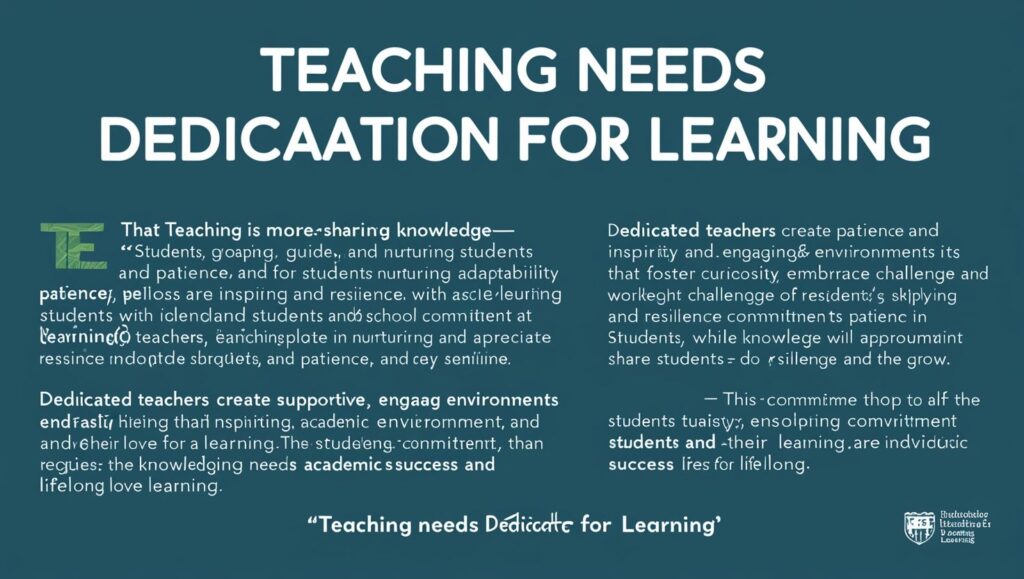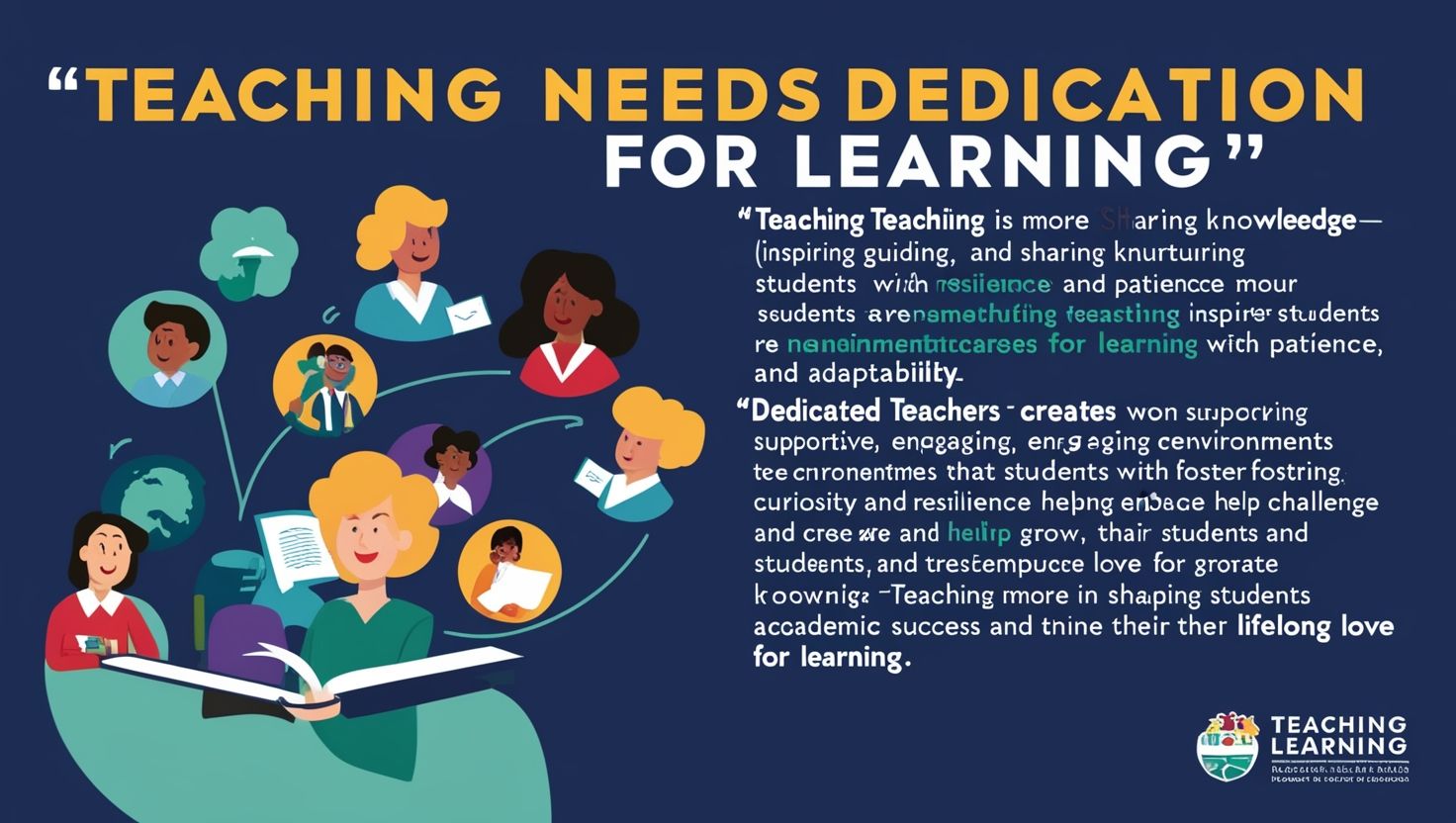Introduction
Teaching Needs Dedication for Learning, Teaching is more than a profession; it is a commitment to shaping young minds, inspiring growth, and fostering an environment where knowledge can flourish. Dedication in teaching goes beyond simply imparting information; it involves a passionate commitment to students’ well-being and educational journey. A dedicated teacher does not just teach; they nurture, motivate, and adapt to the diverse needs of their students. Through dedication, teachers influence not only academic outcomes but also the development of students’ social and emotional skills, fostering a lifetime love for learning.
This article explores the fundamental role of dedication in teaching, its impact on students’ learning, the qualities that define a dedicated teacher, strategies for maintaining dedication, and the challenges teachers face in sustaining this commitment.
Why Dedication is Essential in Teaching
Dedication is essential in teaching because it transforms the classroom into a place of inspiration, resilience, and discovery. Dedicated teachers inspire students to engage actively in learning, sparking curiosity and encouraging them to explore beyond standard curricula. By showing a commitment to learning, teachers model the values of diligence and perseverance, which students are likely to mirror in their academic pursuits.
Research has consistently shown that teacher dedication significantly impacts student outcomes. When teachers are invested in their students’ success, students are more likely to perform well academically, engage in critical thinking, and develop strong problem-solving skills. For example, studies have found that students taught by highly dedicated teachers are more likely to demonstrate improved literacy and numeracy skills, as well as greater enthusiasm for learning. Dedication also fosters trust, which creates a classroom atmosphere where students feel safe, valued, and motivated to learn.
Qualities of a Dedicated Teacher
Dedicated teachers share several common traits that enhance their effectiveness in the classroom:
- Passion for Subject and Teaching: A dedicated teacher demonstrates a genuine enthusiasm for the subject they teach and for the act of teaching itself. This passion is contagious, inspiring students to take an active interest in the subject.
- Adaptability: Dedication often involves flexibility. Every student has unique learning needs, and a committed teacher adjusts their methods to reach each student effectively. This adaptability is particularly important in diverse classrooms where students may vary in background, language, and ability.
- Empathy and Patience: Dedication requires empathy to understand students’ perspectives and patience to guide them through challenges. Teachers who listen and show compassion are better able to connect with students, making it easier to foster a supportive learning environment.
- Resilience and Growth Mindset: Teaching can be demanding, with teachers often encountering setbacks or challenging behaviors. A dedicated teacher maintains resilience and a growth mindset, viewing these challenges as opportunities to improve their practice and understanding.
- Willingness to Invest Time: Dedication often means going beyond standard hours to plan lessons, review student work, and provide additional support. Dedicated teachers are willing to devote this extra time because they see it as essential to their students’ success.
Impact of Dedicated Teaching on Learning
The dedication of teachers significantly enhances the learning experience and outcomes for students. Through dedicated teaching, students feel valued and understood, which in turn encourages them to engage actively and take ownership of their learning.
- Creating an Inclusive Learning Environment: Dedicated teachers make their classrooms safe and inclusive, where students feel comfortable expressing themselves. They acknowledge the diverse learning needs and styles of their students and employ various teaching methods to meet these needs. For example, a teacher who is dedicated to inclusivity may provide additional resources for students with learning disabilities or use visual aids and hands-on activities to reach visual and kinesthetic learners.
- Encouraging a Growth Mindset in Students: Teachers who demonstrate dedication inspire students to adopt a growth mindset, the belief that abilities and intelligence can be developed through effort and perseverance. By modeling persistence, teachers show students that challenges are opportunities for growth. Research by psychologist Carol Dweck has shown that students with a growth mindset are more resilient, better at handling failure, and more motivated to put in the effort required to succeed.
- Enhancing Student Motivation and Engagement: When teachers show that they care about their students’ success, students are more likely to stay engaged. This dedication is particularly important for students who may lack support outside of school. Teachers who take the time to understand their students’ interests and concerns are better able to connect the curriculum to real-world applications, making learning more relevant and engaging.
- Fostering Lifelong Learning: Dedication in teaching extends beyond academic skills; it instills a passion for learning that students carry into their lives beyond school. A dedicated teacher encourages curiosity, critical thinking, and independence, equipping students with the skills they need to continue learning and growing throughout their lives.

Strategies for Teachers to Cultivate Dedication
Teaching is a dynamic field, and teachers must continuously seek ways to maintain and grow their dedication to ensure sustained effectiveness in the classroom. Here are strategies teachers can use to foster dedication:
- Commit to Lifelong Learning: Dedicated teachers recognize the importance of professional growth. They engage in ongoing professional development, staying informed about new teaching strategies, educational research, and technology. This commitment to learning ensures that they are prepared to meet the changing needs of students and adapt to evolving educational standards.
- Embrace Student-Centered Teaching: By placing students at the center of the learning process, teachers can create lessons that are more engaging and impactful. A student-centered approach means understanding each student’s strengths, weaknesses, interests, and goals. Teachers who build relationships with their students are better equipped to create lessons that resonate and inspire.
- Seek Support and Collaboration: Dedication in teaching can be challenging to maintain alone. By collaborating with fellow educators, teachers can gain new perspectives, share resources, and support each other through challenges. School administrators can also support teachers by providing mentoring programs, offering access to resources, and encouraging open dialogue on effective teaching practices.
- Reflect and Set Personal Goals: Self-reflection is a valuable tool for dedicated teachers. By regularly assessing their own performance and setting personal and professional goals, teachers can maintain a sense of purpose and direction. Reflective practices might include journaling, peer observations, or participating in feedback sessions.
Challenges to Maintaining Dedication
While dedication is essential in teaching, it can also be challenging to sustain. Teaching is a demanding profession, and without adequate support, teachers can experience burnout.
- Burnout and Workload: Teachers often work long hours, managing large classes and administrative tasks in addition to teaching. This workload can make it difficult to maintain dedication. To combat burnout, teachers can establish a work-life balance by setting boundaries and practicing self-care. Schools can also play a role by offering manageable workloads and adequate support.
- Limited Resources: Many teachers face a lack of resources, which can hinder their ability to provide the best possible education. For instance, teachers may need to provide their own classroom supplies or manage with outdated materials. Access to funding and resources is critical in enabling teachers to maintain their dedication and meet students’ needs effectively.
- Changing Educational Standards: Education is constantly evolving, with new standards, curricula, and teaching methods being introduced frequently. Adapting to these changes can be challenging, particularly if adequate training and support are not provided. School districts can help by providing clear communication, training opportunities, and resources to ease transitions.
- Emotional Challenges: Teaching involves significant emotional labor, as teachers must manage their own emotions while supporting their students’ emotional needs. Without emotional support, teachers may struggle to sustain their dedication. Schools can assist by offering mental health resources, peer support groups, and counseling services to help teachers manage the emotional aspects of teaching.
Conclusion
Dedication is a fundamental component of effective teaching. It involves a commitment to students’ academic and personal growth, adaptability, and a continuous pursuit of knowledge and skills. Through dedicated teaching, students are more engaged, motivated, and inspired to embrace learning both in and out of the classroom.
However, to sustain dedication, teachers require support from schools, communities, and educational systems. By addressing challenges such as workload, resources, and emotional demands, educators can continue to provide the dedication that makes a meaningful difference in students’ lives. Ultimately, the commitment of dedicated teachers to their students is essential not only for academic success but also for fostering a lifelong love of learning, resilience, and curiosity in the next generation.

8 thoughts on “Teaching Needs Dedication for Learning”
Comments are closed.